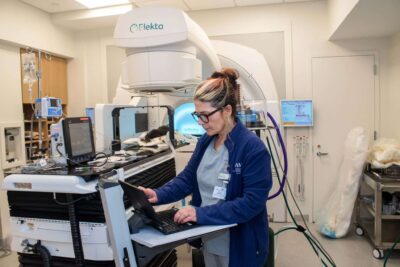How to Find Cancer Care for Your Pet

How to Find Cancer Care for Your Pet
November is National Pet Cancer Awareness Month and, for the rest of the month, my blogposts will focus on cancer and cancer treatment in pets. Last week, I defined the various categories of chemotherapy drugs veterinary oncologists use to treat dogs and cats with cancer. Today, I provide a roadmap for pet owners following a diagnosis of cancer in their favorite fur person.
Does my Pet Need a Veterinary Specialist?
If your pet has a benign tumor and your primary care veterinarian can surgically remove the tumor, you may not need a specialist. But even some benign fatty tumors (lipomas) may require a surgical specialist if the surgery is tricky.
For big surgeries, such as removing a lung or liver tumor, a surgical specialist is the way to go. Most specialists work in multi-specialist hospitals allowing veterinarians to rely on colleagues for their expertise in areas like anesthesia, intensive care and radiology. Your pet’s primary care veterinarian is the best place to start your pet’s cancer journey, and they can help refer you to a specialists if needed.
What Kind of Veterinary Oncology Specialist Does My Pet Need?
Identifying the right cancer specialist for your pet will be one of the tougher tasks of your pet’s cancer journey. Some complicated cancers require three specialists from all three veterinary oncology sub-specialties: a surgical oncologist, a medical oncologist (a specialist in administering chemotherapy) and a radiation oncologist.
To help your pet’s specialty hospital organize the right appointments for your pet, have your primary care veterinarian share your pet’s medical records. Those records should include biopsy reports, lab test results and x-rays or other diagnostic images.
Finding a Cancer Specialist for Your Pet
Your pet’s primary care veterinarian is a good resource to initiate your hunt for a veterinary cancer specialist. If you have hit a dead end with your primary care veterinarian’s recommendations, you will need to become an internet sleuth. You can find an oncologist who administers chemotherapy use via Vet Specialists while the American College of Veterinary Radiologists (ACVR) maintains a list of radiation oncologists.
Finding a specially trained veterinary oncology surgeon is the hardest. First, there are very few of these oncology trained surgeons and, second, they are not easily searchable on the internet. On the American College of Veterinary Surgeons (ACVS) website, there is a list of Veterinary Surgical Oncology Fellows, and you can cross-reference this list with the “Find a Veterinary Surgeon” on the ACVS website to get the contact information of the Surgical Oncology Fellows. However, the ACVS website says that not all board-certified surgeons are listed on their website. Google may be your best option. I suggest you put “veterinary surgical oncology fellow near me” in the search bar and prepare to do some internet sleuthing.
Should I Consider a Clinical Trial for My Pet?
AMC’s oncology team regularly conducts clinical trials. According to the National Institutes of Health, “Clinical trials are research studies that test a medical, surgical, or behavioral intervention in people. These trials are the primary way that researchers determine if a new form of treatment or prevention, such as a new drug, diet, or medical device (for example, a pacemaker), is safe and effective in people. Often, a clinical trial is designed to learn if a new treatment is more effective or has less harmful side effects than existing treatments.” A clinical trial serves the same purpose in veterinary cancer patients.
However, a word of caution: I have found many pet families intuitively believe the new intervention will be better than the old one. Not necessarily true. The purpose of a clinical trial is to figure out which is better: new or old. Choosing the treatment your pet receives is not part of a clinical trial. If you are interested in a clinical trial for your pet, you can search the name of your pet’s tumor on a website maintained by the American Veterinary Medical Association.
I hope you don’t need this guide to finding cancer care for your pet, but if you do, you now have the resources to get your favorite fur person the best treatment possible.

































